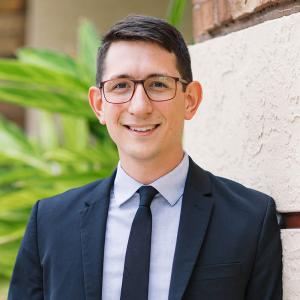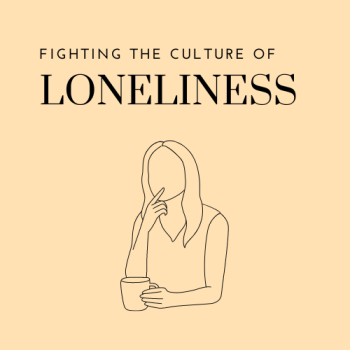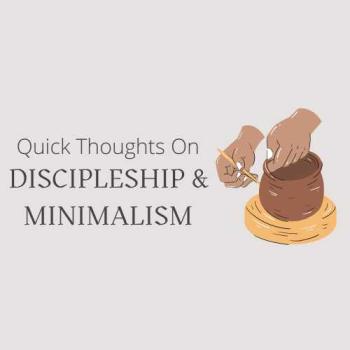
For most believers in the Western world today, victory over anxiety is possible, but it comes from the same place as all of our spiritual growth: from a lifetime of apprenticing under Jesus.
Outside of a miraculous intervention from the Lord, there is no shortcut.
When Jesus Says “Anxious”
Perhaps the most famous teaching in all of scripture about “worry” or, in some translations, “anxiety” comes from Jesus’ teaching in the Gospel according to Matthew. In chapter 6, nearing the end of what we call “The Sermon on the Mount”, Jesus says this:
“Therefore I tell you, do not be anxious about your life, what you will eat or what you will drink, nor about your body, what you will put on. Is not life more than food, and the body more than clothing? Look at the birds of the air: they neither sow nor reap nor gather into barns, and yet your heavenly Father feeds them. Are you not of more value than they? And which of you by being anxious can add a single hour to his span of life? And why are you anxious about clothing? Consider the lilies of the field, how they grow: they neither toil nor spin, yet I tell you, even Solomon in all his glory was not arrayed like one of these. But if God so clothes the grass of the field, which today is alive and tomorrow is thrown into the oven, will he not much more clothe you, O you of little faith? Therefore do not be anxious, saying, ‘What shall we eat?’ or ‘What shall we drink?’ or ‘What shall we wear?’ For the Gentiles seek after all these things, and your heavenly Father knows that you need them all. But seek first the kingdom of God and his righteousness, and all these things will be added to you.
“Therefore do not be anxious about tomorrow, for tomorrow will be anxious for itself. Sufficient for the day is its own trouble.
Perhaps it is because these verses are so familiar to so many of us that we miss the line that here that “isn’t like the others”. There’s this moment in which Jesus seems to stop, and I imagine he softened his tone, and he says, “O you of little faith”.
When Jesus speaks about anxiety, two things are incredibly clear:
- Our anxiety is a lack of faith in God and His provision in our lives
- Jesus’ posture towards our lack of faith is not one of condemnation, but that of the Loving Shepherd
A Lack of Faith
Saying that “our anxiety is a result of a lack of faith” may feel like an immediate attack of insensitivity.
The counter might sound something like, “Faith is a choice, isn’t it? Therefore, you’re saying that I am choosing to be anxious and that if I can just ‘try harder at believing’ then all my anxiety will go away? That reeks of a lack of understanding of mental health and deep insensitivity.”
I think that would be a fair reaction, and it’s certainly the reaction I would have had for much of my twenties when I often wrestled with deep bouts of anxiety. And though it’s a fair reaction, and an understandable one, it isn’t a reaction that offers a solution to anxiety or submits to the teachings of Jesus.
You see, Jesus draws a very direct line between anxiety (or “worry”, depending on your translation) and a lack of faith. And this is not abnormal for Jesus or a “one off” event. Jesus often drew attention to the faith of those around him, whether to call them out for lacking it or to praise them having it. In Mark 6 Jesus could do few miracles in his hometown because of their “lack of faith” and in Luke 18 Jesus heals a blind beggar, and says “Receive your sight, your faith has healed you” (Luke 1842 NIV, emphasis added).
As you read through the Gospels, it’s obvious that these aren’t random examples, but the pattern of Jesus’ ministry. Our faith is, in some way I do not fully understand, linked to our healing and our enjoyment of a full life in Jesus Christ.
And when we lack faith, this often results in our internal turmoil that today we refer to as “anxiety”.
And although this is may seem controversial on its surface, it makes so much sense when we simply stop and consider. How could you or I, if we truly believe in the promises of God as revealed in Scripture, feel anything but a deep and constant peace? Unless, of course, we have moments or seasons in which we look at the promises of God and, though we tell ourselves on the surface we believe, we find when we search our hearts that we are lacking in faith.
No, despite how incredibly difficult it is for us to swallow this truth, it is simply fact that when we feel anxiety, and all of us do, it is a result of our lack of faith in God and His good for us.
Yet God does not look upon our lack of faith with the condemnation and judgment that perhaps we do.
A Loving Shepherd
The thing about shepherds is that sometimes that have to use the crook of their staff to grab one of their sheep and pull it where it should go. I can only imagine that must be an incredibly rough, and jarring, experience to have something suddenly about your neck jerking you to and fro.
But the shepherd only uses that staff to wrangle the sheep he loves.
Jesus is like that with us.
Our anxiety is a sign that our faith is placed somewhere it shouldn’t be: in our marriage, our finances, in how others view us, or in whether or not we feel good. Therefore, when we experience anxiety in our lives, we should allow it to become the catalyst for a plea with the Lord to shape us into people who put our faith in Christ and the Kingdom that Christ is bringing to earth.
When we misdiagnose our anxiety, when we see it as something treatable only as something external, then we only build trust in our ability to regulate our feelings with changes in behavior, self-awareness, or medication.
All of those are good things, by the way. Oftentimes, the Lord may use some or all of those in our apprenticeship to him. But the goal is not to regulate our external factors in order to create a momentary peace in our minds, but to radically submit to the God who gives our soul an eternal peace no matter what Satan, the World, or even our own bodies attempt.
Practical Submission
There are many practical things that we can do to grow in our faith and eliminate anxiety in our lives. For myself, I’ll share below some of the things that I’ve implemented in my life that have created fertile soil in my soul, allowing faith to grow.
1 A Day of Rest Each Week (Sabbath)
The practice of Sabbath is one that, although not popular in many Western churches today, was crucial in the life of the Israelites and common place for believers throughout Church history.
For my family and I, this we choose to do little to no work from Friday evening until Saturday evening.
It’s hard to say much else about what those days look like. We sleep in, play board games with our boys, sip tea while sitting in the backyard and doing… nothing.
We say “no” to most commitments during that window, unless we feel the Lord is calling us to lovingly serve someone during that time. We say “no” to home projects and all those nagging tasks that want to steal our time. We’ve disciplined ourselves to incorporate this day of rest despite a culture around us that is in a constant state of hurry.
Oh, and I also turn my phone off for the day, ensuring my mind has a rest from it as well.
2 Strict Discipline Over My Phone
It’s no secret that our phones are deep sources of dopamine addiction and that anxiety in our culture has spiked since the widespread application of smartphones and social media.
So, it should appear to us as wisdom to set up strict guidelines around our use of cellphones, the same way we’d ensure that alcohol or video games don’t become an obsession for us.
For me, I have chosen to
- Remove all news and social media apps
- Ensure I’m looking at my phone less than 1 hour each day
- Turn my phone off during my day of rest
I think it’s likely that many of us reading this feel a mixture of awe and terror. A sense that we’d love this to be true of us, in theory, but the actual application of these practices would be difficult.
You’d be correct.
It’s not easy turning my phone off and keeping it off each week. And it can be awkward not having even basic apps like YouTube on my phone. But these boundaries have freed up my mind to think about the Lord and focus on other people in a loving and sacrificial way.
Remember, Jesus ends his teaching with “seek first the kingdom of God”, which we know from the life of Christ involves us disciplining ourselves and offering our sin nature up to the Lord to be crucified with him on the cross. If there is something in you that says “I can’t give up…”, then whatever follows that sentence is the very thing you must give up.
3 A Vision of Spiritual Maturity
In Proverbs 29 we read “where there is no vision, the people perish”. This is so true of human nature in general, that when we have no vision for what could be we wither and die spiritually.
Let me tell you a bit about my vision for the life I have following Jesus.
In the years to come, I’m going to watch my soul become freer and freer from anxiety. I will grow to be a person that when all the troubles of life come my way, I do not rant and rave against God or others. Instead, in the quiet of my soul and the privacy of my room, I will kneel before God and agree to wait patiently for Him to remove the suffering, either in this life or the next.
I will grow to be a man who smiles with sincerity and loves the person before me even if they hate me and lie about me. Although I’ll never grow reckless with the life the Lord has given me, I won’t fear death, poverty, or pain.
My time will be well spent in the wisdom that comes from the Lord. Each day I’ll travel through the day feeling unburdened and yet accomplishing so much in the Lord’s kingdom. The hustle and fatigue that I feel now won’t exist in my life in a few years, for I’ll be walking too close to God and His presence.
And one day I’ll die.
And whether in Heaven or at the Resurrection, the Lord will say “well done good and faithful servant” because I was living as a Citizen of Heaven even before Heaven came to Earth in full.
And with that vision of where I’m going, I’ll make my decisions for today.
Join me.
For more content like this, check out the Living Room Disciple Podcast here, or check out our website.













